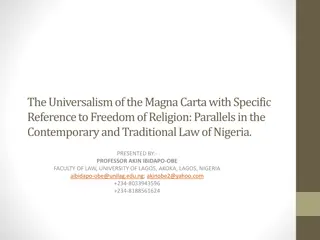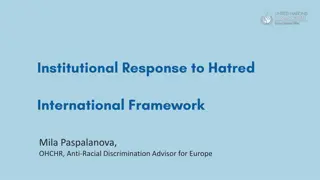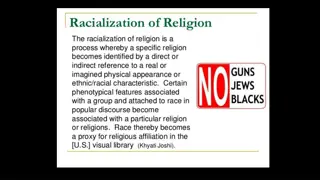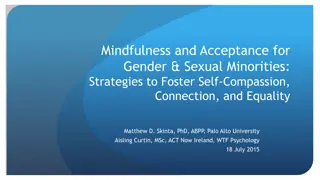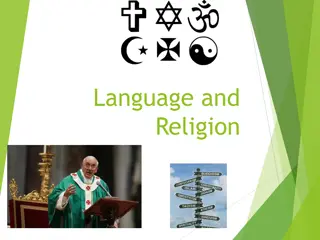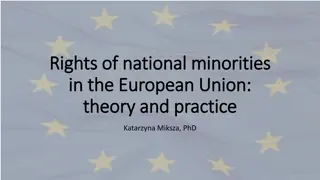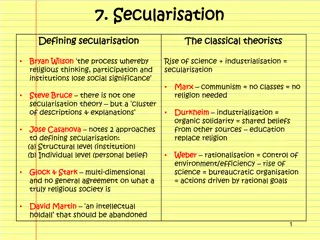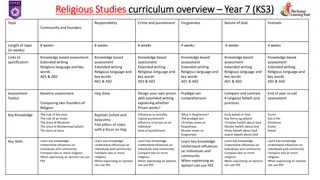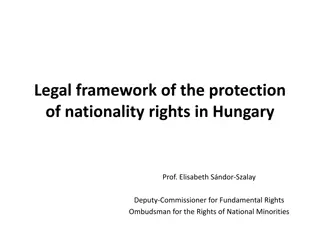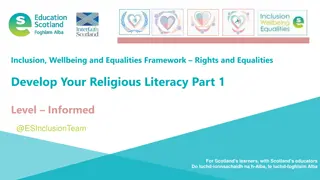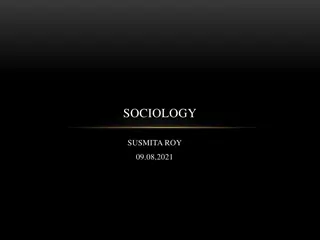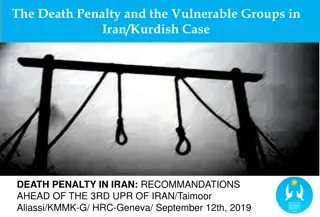Understanding Interfaith Harmony in Islamic Education
The third meeting conducted by the Islamic Education Faculty covered topics such as classroom regulations, tolerance among different religions, the concept of harmony among religious communities, and general challenges related to diversity in religious interpretations. The importance of maintaining
2 views • 13 slides
Status of Family Laws in India: Hindu vs. Religious Minorities
The family and personal status laws in India vary between Hindu law and those pertaining to religious minorities. While Hindu law has seen extensive reforms, discriminatory provisions still exist. In contrast, laws governing religious minorities have undergone fewer reforms, leading to greater inequ
2 views • 4 slides
The Universalism of Magna Carta: Freedom of Religion in Contemporary Nigerian Law
Magna Carta, a pivotal human rights document, is explored with a focus on its religious underpinnings and its influence on modern legal systems. The parallels and divergences between Magna Carta and Nigerian customary law regarding freedom of religion are examined. The implications of contemporary N
0 views • 16 slides
International Human Rights Treaties and Recommendations for Combatting Racism
Mila Paspalanova, the Anti-Racial Discrimination Advisor for Europe at OHCHR, discusses core treaties related to racial discrimination, international conventions, and efforts to combat discrimination based on religion or belief. The content highlights the importance of ICERD, ICCPR, and other key tr
6 views • 16 slides
Religious Education Skills Progression for Years 5 and 6
This document outlines the long-term plan for the RE curriculum for Year 5 and 6 students, focusing on topics such as living by Christian values, exploring wisdom from different faiths, understanding the creation of the world, and expressing faith through art. It also covers the progression of skill
0 views • 31 slides
Religious Policies of Queen Elizabeth I: Seeking a Middle Way
Queen Elizabeth I of England navigated religious turmoil by establishing a middle way that balanced Protestant and Catholic elements. Her reign saw the passing of acts like the Act of Supremacy and Act of Uniformity to consolidate her power and create a distinct Church of England. Despite facing opp
0 views • 21 slides
Understanding Religious Conflict: Definition and Types Explored
Religious conflict is a complex and recurring concept throughout history. Scholars have defined it as disagreements between religious groups. This conflict arises from contentious issues touching on ideology, morality, power, and identity, influenced by various socio-political, economic, and cultura
1 views • 13 slides
Evolution of Akbar's Religious Policy: A Historical Overview
In the 16th century, Akbar the Great implemented a revolutionary religious policy in the Mughal Empire. Initially a devout Sunni Muslim, Akbar evolved his stance to promote harmony and equality among all religions, fostering tolerance and understanding. This shift marked a significant departure from
1 views • 25 slides
Embracing Religious Pluralism for a Harmonious Society
Educate yourself on world religions and religious oppression, empathize with religious minorities, combat generalizations, and promote belief inclusion in all aspects of life for a more just and peaceful world.
0 views • 6 slides
Elizabethan Religious Settlement: Unity Amidst Division
Amid religious division in England, Queen Elizabeth I implemented a Religious Settlement in 1559 to unify the country. The settlement, a blend of Protestant and Catholic elements, aimed to maintain peace and prevent rebellions. Elizabeth's strategic compromise pleased most people, though lingering t
0 views • 14 slides
Understanding Secularism: Principles and Advantages
Secularism is the principle of separating government institutions from religious entities to ensure equal rights for believers and non-believers. It safeguards freedom of religious belief and practice, upholds religious freedom, and promotes democracy and fairness. Secularism aims to prevent religio
0 views • 21 slides
Understanding Religious Language: Cognitivism vs. Non-Cognitivism in the University Debate
This discussion explores the debate between cognitivism and non-cognitivism in religious language. Cognitivism asserts that religious claims aim to describe the world and can be true or false, while non-cognitivism argues that such claims express attitudes and cannot be verified. Flew's challenge qu
0 views • 9 slides
High Commissioner on National Minorities (HCNM) Mandate and Activities
The High Commissioner on National Minorities (HCNM) was established in 1992 by the OSCE to prevent conflicts related to national minority issues. Through quiet diplomacy and early warning mechanisms, the HCNM works to identify and address ethnic tensions that could threaten peace and stability among
0 views • 8 slides
Guide to Using the BSA Calendar of Religious Observances
The BSA Calendar of Religious Observances is a valuable resource for scheduling scouting events in consideration of various religious holidays and observances. This guide provides an overview of the calendar, highlights important dates, and emphasizes the importance of respecting religious diversity
0 views • 8 slides
Strategies for Self-Compassion and Equality in Gender and Sexual Minorities
This content discusses mindfulness and acceptance strategies to foster self-compassion, connection, and equality for gender and sexual minorities. It emphasizes the importance of understanding personal histories and breaking free from societal stigma to access freedom and peace. The text also touche
0 views • 16 slides
Understanding Hindu Nationalism: From History to Contemporary Realities
Delve into the complexities of Hindu Nationalism through an exploration of its historical roots, contemporary manifestations, and the distinction between Hindutva and Hinduism. Explore key themes, readings, and debates surrounding the rise of Hindu Nationalism in India, shedding light on its implica
0 views • 15 slides
Understanding the Role of Language in Religion
Exploring the significance of language in religious contexts, this content discusses the functions, features, lexicon, grammar, and metaphorical aspects present in religious language. It delves into how religious language upholds spiritual beliefs, persuades believers, and expresses specific attitud
0 views • 8 slides
Understanding the Cultural Dimensions of Food and Religious Influences in Culinary Arts
Explore the impact of religious beliefs on food traditions and dietary restrictions across different cultures in the culinary world. Learn about the influence of major world religions on eating habits, food choices, and culinary practices. Discover how various religious groups, such as Christians, o
0 views • 26 slides
The Vital Role of Religious Institutions in Supporting Immigrants
Religions and immigration are interlinked in modern societies, where religions play a significant role in providing services, defending rights, and supporting the social cohesion of immigrants. Mainstream religious institutions serve as key actors in offering assistance, advocating for migrant right
2 views • 14 slides
Understanding Religious Language: Flew, Hare, Mitchell
Exploring the contrasting views of cognitivism and non-cognitivism in the context of religious language through the perspectives of Flew, Hare, and Mitchell. Delve into Flew's challenge on the undetectable gardener, Hare's concept of bliks, and Mitchell's response to the rationality of religious bel
0 views • 7 slides
Rights of National Minorities in the European Union: Theory and Practice
This content delves into the protection and recognition of the rights of national minorities within the European Union. It covers various aspects such as antidiscrimination efforts, the application of non-discrimination principles, the role of Member States, and the EU's policies on minority rights.
1 views • 29 slides
Religious Accommodation in the Army: Advising Command
The content discusses the role of the Chaplain Corps in advising Soldiers and leaders on religious accommodation in the Army as of February 13, 2019. It covers learning objectives, legal foundations, Army policies, procedures, recent changes, and references related to religious accommodation. The in
0 views • 36 slides
Challenges to Religious Freedom in India: An Overview
India, as the world's largest democracy with a tradition of secularism, faces escalating challenges to religious freedom and civil society. The BJP-led government's Hindu nationalist agenda has led to systematic violations of religious rights, targeting minorities and activists. The tightening grip
0 views • 20 slides
Challenges and Disparities in Minority Health and Workforce
The content discusses the challenges faced by minorities in health care settings, focusing on the impact of COVID-19 and disparities within the workforce. It highlights the importance of addressing social determinants of health, such as economic inequalities and racial disparities, to ensure holisti
0 views • 7 slides
Understanding Religious Discrimination Laws in California Workplace
Learn about the regulations and protections under FEHA and Title VII in California, including religious exemptions, accommodation requirements, case studies, and best practices to address discrimination issues effectively. Discover the statistical insights on religious discrimination complaints and
0 views • 45 slides
Understanding Secularisation: The Decline of Religious Influence in Society
Secularisation refers to the process in which religious thinking, participation, and institutions lose their social significance. This phenomenon is influenced by factors such as the rise of science, industrialisation, changing social attitudes, and the disengagement of the church from society. Evid
0 views • 8 slides
Philosophers' Views on Religious Experience: Insights and Critiques
This lesson delves into the perspectives of various philosophers such as Rudolph Otto, Richard Swinburne, John Hick, and Michael Persinger on religious experiences. It explores concepts like the numinous, religious knowledge, God's existence, and criticisms on the validity of religious experiences.
0 views • 7 slides
Philosophers' Views on Religious Experience: Insights from William James
Explore William James' perspective on religious experiences, including his views on existential and value judgments. Understand how James argued for the validity of religious experiences and their potential proof of God's existence. Delve into the implications of emotions and prior beliefs on interp
0 views • 7 slides
Religious and Social Conflicts Fueling the Rise of Absolutism in Europe
Social, economic, and religious conflicts in Europe played a significant role in the emergence of absolutism where monarchs wielded supreme power without sharing it with legislative bodies. Events like Spain's religious conflicts, Protestantism in England, the Spanish Armada, religious conflict in t
0 views • 10 slides
Religious Pluralism and Civil Society: A Paradox in Government Control
Understanding the intricacies of religious pluralism in the context of government control reveals a paradox where restricting religion can hinder social cohesion and economic growth. Through insights on the counterproductivity of control, the role of religious organizations in civil society, and the
0 views • 16 slides
US Religious Freedom Restoration Act (RFRA) Overview
The US Religious Freedom Restoration Act (RFRA) aims to protect the free exercise of religion by ensuring that governments do not substantially burden religious practices without compelling justification. It emphasizes striking a balance between religious liberty and governmental interests through t
0 views • 9 slides
Minority Health Disparities and Disabilities: Addressing Inequities in Care
Disabilities intersect with racial and ethnic minorities, leading to disproportionate health challenges. The COVID-19 pandemic has further exacerbated these disparities, especially among unpaid family caregivers. Recommendations include data disaggregation and inclusive efforts to address social det
0 views • 7 slides
Religious Studies Curriculum Overview for Year 7 and 8 (KS3)
Explore various topics such as responsibility, crime and punishment, forgiveness, nature of God, festivals, community, founders, worship, creation, life after death, rules and laws, relationships in this detailed Year 7 and 8 (KS3) Religious Studies curriculum. The curriculum includes assessments, e
0 views • 6 slides
Electoral Systems and Minority Representation
Various electoral systems, including district and at-large voting, impact how minorities are represented in government. District systems can provide more proportional representation for minorities if they are geographically concentrated, while at-large systems often result in minority under-represen
0 views • 14 slides
The Impact of Volksgemeinschaft in Nazi Germany
The concept of Volksgemeinschaft in Nazi Germany aimed to create a racial community of pure Germans while excluding outsiders, especially Jews. It emphasized the Aryan master race, traditional gender roles, and discriminatory policies against minorities. Despite attempts to promote unity and loyalty
0 views • 8 slides
Legal Framework for Protection of Nationality Rights in Hungary
The legal framework for protecting nationality rights in Hungary is outlined, detailing the historical background dating back to 1989 and the constitutional provisions that recognize national and ethnic minorities as State-constituting elements. The article explains the rights granted to minorities,
0 views • 40 slides
Developing Religious Literacy for Educators in Scotland
This resource aims to enhance educators' understanding of religious literacy by exploring religious discrimination, core beliefs of major faiths, and additional learning sources. It encourages educators to consider the needs of learners in relation to their religious beliefs in Scotland.
0 views • 30 slides
Understanding Minority Groups in Sociology
Sociologist Louis Wirth defined minority groups as those singled out in society for differential treatment due to physical or cultural characteristics, leading to collective discrimination. Membership is both objectively ascribed and subjectively applied. Minority group status can be based on race,
0 views • 12 slides
Settling the Northern Colonies: Religious Transformation and Colonization
The Protestant Reformation led to the emergence of Puritanism in the Northern Colonies, with figures like Martin Luther and John Calvin shaping religious beliefs. The Massachusetts Bay Colony stood as a beacon of self-government and religious ideals, while dissenters like Anne Hutchinson and Roger W
0 views • 9 slides
The Death Penalty and Vulnerable Minorities in Iran: Challenges and Recommendations
Iran is a diverse country with multiple ethnic and religious groups, yet power is predominantly held by the Persian-Shiite group. Minorities like Kurds, Ahwazi-Arabs, Azerbaijanis, Baluchis, and Turkmens face discrimination and challenges, including repression and unemployment. The Iranian Constitut
0 views • 15 slides


